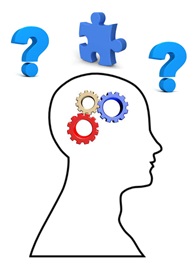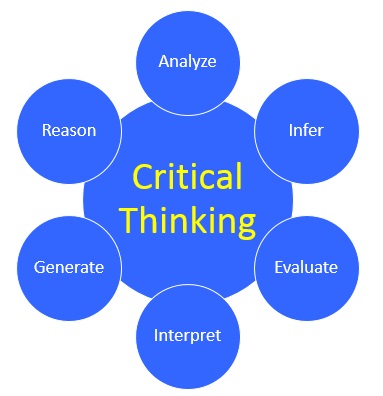Critical Thinking
Critical thinking refers to the process of actively analyzing, assessing, synthesizing, evaluating and reflecting on information gathered from observation, experience, or communication. It is thinking in a clear, logical, reasoned, and reflective manner to solve problems or make decisions. Basically, critical thinking is taking a hard look at something to understand what it really means.
Critical Thinkers
Critical thinkers do not simply accept all ideas, theories, and conclusions as facts. They have a mindset of questioning ideas and conclusions. They make reasoned judgments that are logical and well thought out by assessing the evidence that supports a specific theory or conclusion.
When presented with a new piece of new information, critical thinkers may ask questions such as;
“What information supports that?”
“How was this information obtained?”
“Who obtained the information?”
“How do we know the information is valid?”
“Why is it that way?”
“What makes it do that?”
“How do we know that?”
“Are there other possibilities?”
Combination of Analytical and Creative Thinking
Many people perceive critical thinking just as analytical thinking. However, critical thinking incorporates both analytical thinking and creative thinking. Critical thinking does involve breaking down information into parts and analyzing the parts in a logical, step-by-step manner. However, it also involves challenging consensus to formulate new creative ideas and generate innovative solutions. It is critical thinking that helps to evaluate and improve your creative ideas.
Elements of Critical Thinking
Critical thinking involves:
- Gathering relevant information
- Evaluating information
- Asking questions
- Assessing bias or unsubstantiated assumptions
- Making inferences from the information and filling in gaps
- Using abstract ideas to interpret information
- Formulating ideas
- Weighing opinions
- Reaching well-reasoned conclusions
- Considering alternative possibilities
- Testing conclusions
- Verifying if evidence/argument support the conclusions
Developing Critical Thinking Skills
Critical thinking is considered a higher order thinking skills, such as analysis, synthesis, deduction, inference, reason, and evaluation. In order to demonstrate critical thinking, you would need to develop skills in;
Interpreting: understanding the significance or meaning of information
Analyzing: breaking information down into its parts
Connecting: making connections between related items or pieces of information.
Integrating: connecting and combining information to better understand the relationship between the information.
Evaluating: judging the value, credibility, or strength of something
Reasoning: creating an argument through logical steps
Deducing: forming a logical opinion about something based on the information or evidence that is available
Inferring: figuring something out through reasoning based on assumptions and ideas
Generating: producing new information, ideas, products, or ways of viewing things.
Links



